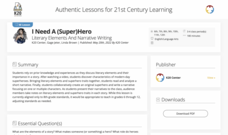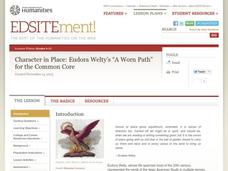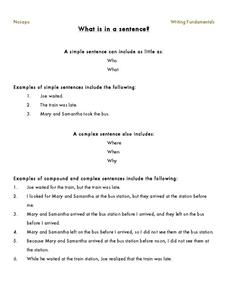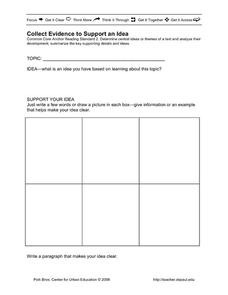Curated OER
Writing Organizers
Eight graphic organizers to choose from? That's right! Each of these organizers relates to writing or reading. From narrowing a writing topic, to responding to literature, to planning a writing project, you'll find many purposes for...
Curated OER
"The Charge of the Light Brigade": Writing Prompt and Pre-writing
Inspire your learners to experience poetry in an entirely different way with this resource. A writing prompt that goes along with "The Charge of the Light Brigade" by Alfred Lord Tennyson, learners craft a reflective piece in the voice...
K20 LEARN
I Need A (Super)Hero: Literary Elements And Narrative Writing
Need a hero? Super! Groups create their modern-day marvel and craft a narrative with all the elements required in such a tale.
Curated OER
A High-Interest Novel Helps Struggling Readers Confront Bullying in Schools
Bully, bullied, or bystander? Paul Langan's The Bully is the anchor text in a unit that examines bullying and violence. After a close reading of the text, readers imagine themselves as the characters and consider how they would react in...
Orlando Shakes
Shakespeare in Love: Study Guide
What word has two syllables and means a ray of moonlight? If young readers guessed moonbeam, they are correct! With the Shakespeare in Love study guide, participants test their guessing skills in an exciting game of Shakespeare Taboo...
Curated OER
An Introduction to The Catcher in the Rye
Who is J.D. Salinger? Give your class some information on the famous recluse before reading his only novel, The Catcher in the Rye. His life and works are detailed, and there are even a few slides dedicated to controversies and criticism...
Polk Bros Foundation
Common Core Constructed Response Organizer
Get your writers ready to compose a constructed response essay in response to either an informational or fictional text. Pupils note down the big idea they wish to address as well as up to nine examples from the text that they wish to...
Weber County Library
Abstract Ideas Explored: Writing with Extended Metaphor
A 25-page packet includes eight detailed lesson plans centered around poems by Emily Dickinson. Each lesson begins with a burning question that high schoolers attempt to answer by using evidence from Dickinson's poems.
National Endowment for the Humanities
Character in Place: Eudora Welty’s “A Worn Path” for the Common Core
How do writers use the interaction between elements like characterization and setting to create meaning? Readers of "A Worn Path" create a series of comic book-style graphics of Eudora Welty's short story and reflect on how Welty uses...
K20 LEARN
Speak Your Truth: Techniques in Spoken Word Poetry
As part of a study of Spoken Word Poetry, class members watch a series of performance videos and note where poets get their ideas and the performance techniques used by the poets. Pupils then draft and share their poems.
National Endowment for the Humanities
A “New English” in Chinua Achebe’s “Things Fall Apart”: A Common Core Exemplar
To examine the “New English” Chinua Achebe uses in Things Fall Apart, readers complete a series of worksheets that ask them to examine similes, proverbs, and African folktales contained in the novel. Individuals explain the meaning...
Curated OER
Aztec Myths: Writing Editorials
Middle schoolers write an editorial giving an opinion of whether or not Quetzalcoatl has arrived and if so, what the Aztecs should do. They discuss whether or not they believe Quetzalcoatl is a god or a man, and use an Editorial...
National Endowment for the Humanities
Emulating Emily Dickinson: Poetry Writing
High schoolers analyze mood and voice in Emily Dickinson's poem, "There's a Certain Slant of Light." After the analysis, students write a poem of their own emulating the Dickinson poem, and then write a one-page essay describing what...
The Big Read
The Grapes of Wrath - Discussion & Writing Activities
Add a great resource to your collection of The Grapes of Wrath curriculum materials. A thorough packet contains loads of useful suggestions, whether you use the novel as an anchor text, as a reading circle option, or as independent reading.
Polk Bros Foundation
I Can Comprehend a Paragraph, then a Page/Section in a Text
Help your class tackle chunks of text with a simple graphic organizer. Pupils read three paragraphs and, as they read, draw pictures in the provided boxes that demonstrate what each paragraph says. There are three boxes on the page and...
Curated OER
Writing Myths I
Explain a natural phenomenon in an original myth. After researching the phenomenon they have chosen, young readers use factual information to include in their myth. They find synonyms and new phrases to create vivid images as they write...
College Board
2006 AP® English Literature and Composition Free-Response Questions Form B
It is not about where you are going, but the journey to get there. Scholars choose a play or novel in which a character takes a journey. They then create essays describing what the journey meant to the overall piece of work. Learners...
College Board
2006 AP® English Language and Composition Free-Response Questions
What does your lawn decoration say about you? The 2006 AP® English Language and Composition Free-Response Questions offers three prompts in which scholars express themselves through essay writing. One of these tasks includes analyzing...
Curated OER
Daughters Come of Age in Women's Fiction
Introduce your young readers to fiction written by women authors. For each story, they explore the way these daughters discover and claim their own identities. Individually, class members use the literature to examine their role in their...
Curated OER
Lincoln is in the House! ("Name-Dropping" Poems and the Power of Connotation)
“What’s in a name?” Just about everything. Barack Obama, Vincent van Gogh, Justin Bieber. Famous names evoke a multitude of reactions and poets often use the names of famous people in their works precisely because names carry...
Nosapo
What Is in a Sentence, Paragraph, and Story?
Language arts is made up of many parts. Learners review the parts of a sentence, as well as how to make a simple sentence into a complex sentence, before examining full paragraphs and identifying the topic, body, and concluding sentence...
PB Works
The Short Stories of Ernest Hemingway
There is more going on under the surface of Ernest Hemingway's work than one can glean in an initial reading. A literature resource compares the themes and structures of several of Hemingway's works before prompting class members to use...
Curated OER
Like Water for Chocolate: Family Tradition
Engage young writers in family tradition with this writing assignment for Like Water for Chocolate, by Laura Esquivel. Using sensory details, learners write a narrative about a family tradition involving food. Scholars also talk with...
Polk Bros Foundation
Collect Evidence to Support an Idea
In order to support an idea, writers must use evidence. Your class members can prepare their evidence with this basic activity. Writers note down the topic they are learning about and their own idea. Next, they come up with information...

























